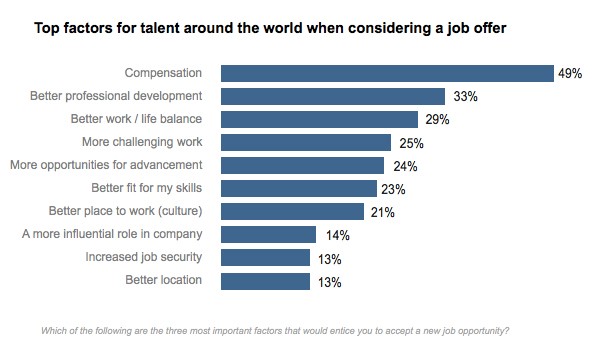Time, Not Money, is the #1 Factor for Winning Over Passive Candidates
Last week, I read LinkedIn’s Talent Trends 2015. This is an insightful report that covers what people around the world are looking for when changing jobs. There is invaluable information about how to describe your positions, the role of the hiring manager and how to better manage the entire interviewing experience.
Despite this value, the part that caught my eye was the criteria candidates use to consider changing jobs. The report inferred that the compensation a candidate gets on Day 1 is the most important criteria for changing jobs.
This is not what I’ve experienced and I disagree.
Here is why money is not the driving factor for passive candidates to talk to you:
People who aren’t looking for another job (aka passive candidate) often get disruptive calls from recruiters. Unfortunately, most recruiters fall into the “What money do I get on day 1?” trap and this kills their chance of having a meaningful career conversation.
Here’s how this plays out. Passive candidates surprised by the call often ask some basic questions like, “What’s the title, company, location and compensation?” Recruiters fall into the trap by giving them the answers. The problem with this is that passive candidates use this short-term information to decide if they should invest the time to have a long-term career discussion. Since it takes a few hours spread over a few weeks to obtain this information, it’s easier to just say “no.”
However, the conversation is different when former bosses, past co-workers, or a recruiter the person has worked with in the past gives a passive candidate the same call about a potential career move. In this case, the prospect is more open-minded, more courteous, and more willing to invest some time to determine the career merits of the position. If everything goes smoothly and these people ultimately decide to accept an offer, what they get on Day 1 (company, title, location, compensation) is less important than the career opportunity inherent in the new position.
Most candidates, whether they’re looking or not, lack concrete job knowledge so they will naturally focus more on compensation. However, once they obtain full job knowledge, significant rebalancing of these priorities occurs.
For example, if the job is a lateral transfer, the only reason the person will take it is for more money and more convenience. If it’s a downgrade, they’ll only take it for a lot more money. And if it’s a major career move, they’ll take less money than initially desired and sometimes no increase at all if the upside career potential is huge.
Here are some tips on how to avoid the “what money do I get on day 1” conversation and instead have a talk about the career upsides of a new job:
How to get passive candidates to engage in a career (not money) discussion
Here are 5 steps you can take:
- First, ask if the person would be open to exploring a potential career move. Don’t provide any Day 1 information as part of this question. Here’s a post that describes this technique in more detail.
- When the person says “yes,” you can delay the compensation discussion by saying, “Great. Let’s first see if the opportunity makes career sense and, if so, we can then see if the compensation matches your requirements.”
- Suggest as a first step that you’d like to review his or her LinkedIn profile for a few minutes and then give the person an overview of the job. Follow-up by saying that if it’s not a career move you can at least network and stay in touch.
- During this initial profile review look for three to four factors in your open spot that would be considered career opportunities. These include items like company growth rates, more interesting projects, span of control, influence, potential impact and visibility.
- Highlight these factors as you describe the job. Then suggest having another more in-depth conversation to better understand the career potential of the job. If the opportunity gap is big enough, you’ll get easy agreement.
Time matters when recruiting anyone who’s not desperate to change jobs. That’s why in a recent post i suggested adding a time delay factor to the “Apply Now” button. The purpose was to prevent qualified candidates from opting out before they learned the career merits of the job. Changing jobs for any high potential person is a long-term decision requiring a series of discussions spread over multiple meetings. It’s not a transaction to be negotiated during the first call. Avoiding the Day 1 trap starts by understanding how easy it is to fall into it.
To receive blog posts like this one straight in your inbox, subscribe to the blog newsletter.
Topics: Recruiting tips
Related articles





